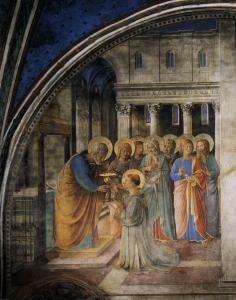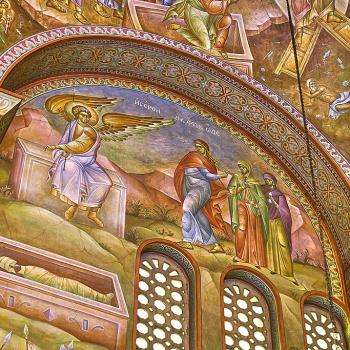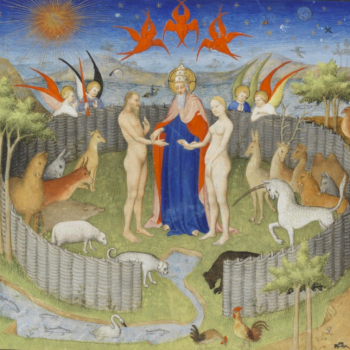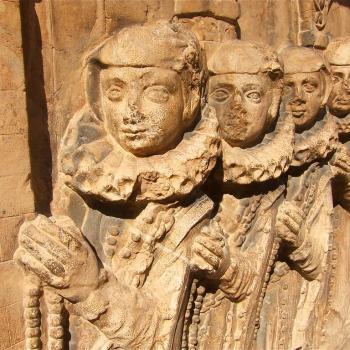
When the Christian church was growing in size, the Apostles found it becoming more and more difficult to serve everyone’s needs. This led to all kinds of conflict in the early Christian community, as everyone thought the Apostles should be focused on their needs, even if it meant they would neglect the needs of others. Because of this, the Apostles created the order of deacons, an order which would be focused serving the needs of the people while the Apostles continued their evangelical work:
Now in these days when the disciples were increasing in number, the Hellenists murmured against the Hebrews because their widows were neglected in the daily distribution. And the twelve summoned the body of the disciples and said, “It is not right that we should give up preaching the word of God to serve tables. Therefore, brethren, pick out from among you seven men of good repute, full of the Spirit and of wisdom, whom we may appoint to this duty. But we will devote ourselves to prayer and to the ministry of the word.” And what they said pleased the whole multitude, and they chose Stephen, a man full of faith and of the Holy Spirit, and Philip, and Prochorus, and Nicanor, and Timon, and Parmenas, and Nicolaus, a proselyte of Antioch. These they set before the apostles, and they prayed and laid their hands upon them. And the word of God increased; and the number of the disciples multiplied greatly in Jerusalem, and a great many of the priests were obedient to the faith (Acts 6:1 – 7 RSV).
The Apostles found their solution worked at least at first, as the immediate needs of the community was met. But, as Christianity spread, and more churches were established, each church would find itself going through similar issues, and so, more and more deacons would be established.
Since the Apostles set up and created the diaconate, instead of it being an order directly established by Christ, this shows they had the authority to create ecclesiastical positions, including, and especially those with orders, even as they had the authority to determine who would be chosen for those orders, and the role those orders would have in the growing institutional church. Over time, the role of deacons would change, with some being given more, some less, authority, than other. Norms for the diaconate, just like that of the priesthood, were not consistent. No one thought that the earliest norms, represented in Scripture, had to be preserved. The diaconate was a position established in and by the institutional church, for the sake of the institutional church and its mission, and so could be regulated by the institutional church.
We do not know exactly when, but we know it was during the apostolic era, women were brought into the diaconate, because Paul talks about St. Phoebe, a deacon who helped him in accordance to her position in the church:
I commend to you our sister Phoebe, a deaconess of the church at Cenchreae, that you may receive her in the Lord as befits the saints, and help her in whatever she may require from you, for she has been a helper of many and of myself as well (Rom. 16:1- 2 RSV).
Paul not only said that Phoebe had been of service to him, he said that her role in the church meant others in the church should heed what she tells them to do, indicating that she had been given some position of authority in the church (and not just over women, as he was not writing to women alone). While we know, therefore, one church had a woman deacon, we do not know how many other women deacons there were. Theodoret suggested that only those with a large community had one:
And so large was the congregation of the church of Cenchreae that it even had a woman deacon, one both famous and celebrated: she had so great a wealth of virtuous actions as to earn such encomiums from the apostolic tongue – patron as she herself has been to many including myself, he says, note. Now, by patronage I am inclined to think he refers to her hospitality and care, and he rewards her with multiple comments. I mean, it is likely she received him into one house for a short time – namely, the period he spent in Corinth — whereas he introduced her to the world, and on all land and sea she became famous: not only the Romans and Greeks knew of her but also all the barbarians.[1]
Theodoret believed, among those services she rendered to Paul, were those of hospitality, which is why she welcomed Paul into her home, something which would not have been acceptable at a later age. Once again, this is because the role of women deacons, as the role of all deacons, changed over time, including the discipline they were expected to follow. While she became quite famous, it seems that her fame was somewhat lost over time, as the role of women in the diaconate was undermined in history. This is why, when she was remembered, and recognized as a deacon, many have tried to find a way to deny that she was fully a deacon, and suggest she held some secondary, lesser position, so that they can continue to deny women deacons in the church. But it is clear, if we examine church history, women certainly held ministerial positions, and it was only later this was denied them:
And therefore, this passage teaches two things at the same time: As we have said, women are to be considered ministers in the Church, and the kind who have assisted many and who through good services have merited attaining unto apostolic praise ought to be received in the ministry.[2]
Just as we would not look at a deacon as doing the same things which are done by monks, we should not think woman deacons serve the same function as nuns. To be sure, many ways deacons have served the church can be done by someone without diaconal orders, including monks. But we do not normally use that possibility to suggest we should no longer employ the use of male deacons. Similarly, then, we should not use the possibility that nuns can fulfill many of the functions of a deacon as an excuse to deny women the ability to become deacons. And, certainly, just as the role of male deacons has changed over time, so we do not use the most restricted norms to deny deacons their potential today; we should not look at disciplines established in a different time, different place, established for women deacons and think they cannot be changed (especially as Phoebe held her position as a deacon without having those requirements imposed upon her). Deacons, after all, serve the institution through a role created by the institutional church itself, and so the church has authority to promote women deacons and increase their role in the church, especially as the social reasons why they did not in earlier era do not apply to the modern age.
[1] Theodoret of Cyrus, Commentary on the Letters of St. Paul. Volume One. Trans. Robert Charles Hill (Brookline, MA: Holy Cross Orthodox Press, 2001), 135 [Romans].
[2] Origen, Commentary on the Epistle to the Romans: Books 6-10. Trans. Thomas P. Scheck (Washington, DC: CUA Press, 2002), 291 (cf. Rom 16:12).













